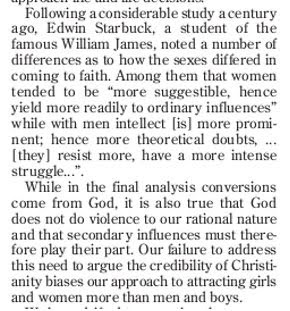
CEN FRIDAY, MARCH 12, 2010 No: 6014 www.churchnewspaper.com
As a female who enjoys Bible study, academic theological debate and who responds well to a doctrinally led, reasoned approach to the bones of my faith; I was somewhat perplexed by Mr Alan Bartley’s letter, 12 March 2010. This is due to the fact that he seems under the impression that all men are rational, intellectual and level headed beings and that conversely, all women are emotional, silly and suggestible and by implication, lack sound judgement. He quotes research by an Edwin Starbuck (conducted as recently as 100 years ago); citing it as proof of his theories about women and men and the state of the church today.
“Edwin Starbuck, a student of the famous William James, noted a number of differences as to how the sexes differed in coming to faith. Among them that women tended to be “more suggestible, hence yield more readily to ordinary influences” while with men intellect [is] more prominent;”
Quite apart from the fact that this research was conducted on Edwardian women who wouldn’t have had much in the way of formal education and would therefore have had little experience, opportunity or expectation of being asked to think academically; it is also well out of date in that the men who did the research would have had a whole range of prejudices that few in this day and age would share, (mostly because they have been disproved: i.e. women brains are smaller and therefore less intelligent etc.)
In addition, Mr. Bartley states that anyone who disagrees with his suggestion that gender stereotypes are true are apparently ‘mad’.
“we would be mad to deny that the stereotypes are true of how the bulk of men and women approach life and life decisions.”
This statement is one way to stifle opposition I suppose, but hardly an intellectual one. In fact it seems to my female mind that this would seem to be a more emotive argument, based on dubious experience and opinion.
Mr. Bartley goes on to tell us that women are apparently attracted to Christianity because the church has failed to ‘argue the credibility of Christianity’; but has relied on emotional appeal not reason, which (according to Mr Bartley) is what ‘lights our candle’. As an evangelical woman about to be ordained, I know how much importance Evangelicals put on sound biblical exegesis and argument. Mr. Bartley clearly doesn’t spend much time in evangelical circles if he thinks our whole approach is experiential. Maybe the reason he hasn’t come across women of intellect is because they are not tolerated in his church? I praise God that Jesus encouraged Mary to learn at his feet, the attitude of a disciple and rabbinical trainee, that St Paul commended the teaching abilities of Priscilla and Timothy’s mother and grandmother and that Deborah led Israel and was blessed by God for her sound judgement and spiritual advice. Having said all of this, to deny the relevance of spiritual experience as Mr. Bartley seems to do, is to deny vast swathes of the biblical account. Jesus didn’t spend the whole of his ministry in the synagogue using his reason and intellect, he went out and healed the sick, raised the dead and was moved to tears by the death of a friend. He gave his friends supernatural experiences - Peter walked on water, met Elijah and Moses etc. He encouraged his followers to pray, believing that answers would come and appeared not to despise leaps of faith alongside doctrinal reasoned argument - the thief on the cross springs to mind.
Mr. Bartley seems to think that the less academic approach of the Post Modern world is down to feminisation. I have studied Post Modernism as part of my course. I was under the impression that Post Modernist thought was more down to the rejection of a Modernist reasoned hypothesis which stated that humanity would continue to improve and develop and reach an eventual utopia. This was a humanist doctrine: biblically incorrect, dangerous and against the truth of the gospel. Thus I would respectfully argue that reason can be just as damaging as emotion and can serve to promote untruth and unbelief. People have rejected it because it has been shown to be untrue in this context. If we want a balanced approach to faith then we need both reason and experience. Doctrinal understanding is essential and a good grasp of theology necessary, but so too is an appreciation of the mystery and majesty of God. The understanding that we are human and that he is so much more than we can ever fully understand. You don’t have to be a woman to grasp that, you just have to have spent some time in his company.
2 comments:
Oh dear, I think Mr. Bartley is living about 100 years in the past. He also seems to find it difficult to reason beyond a few startling assumptions and sweeping generalisations. You are also right to say that we need both reason and experience. Some people ( male and female) can engage in very limited or faulty "reasoning" and consider it bullet proof, especially in areas such as faith and theology!
you would be amazed how many seemingly intelligent people still believe that men are more 'rational' than women - had this argument with someone recently and was just gobsmacked at the deeply entrenched view.
Post a Comment